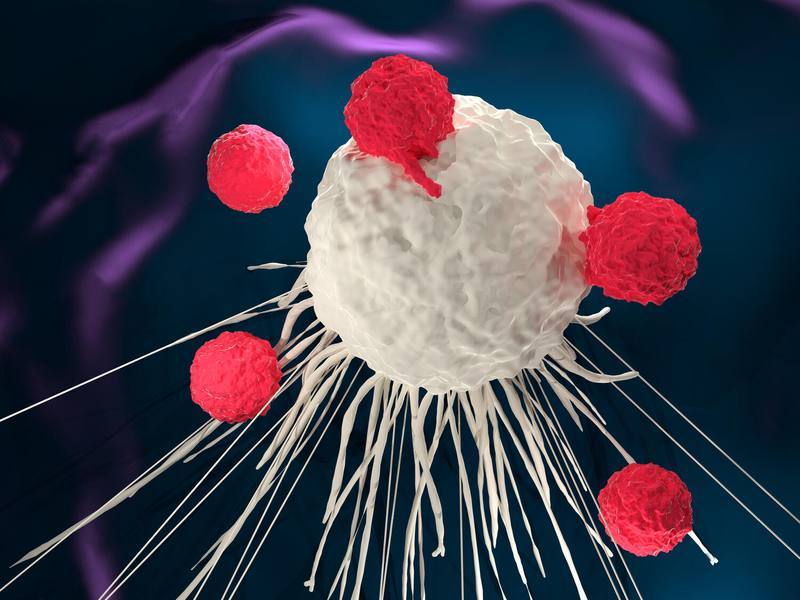-
Mayo Clinic Comprehensive Cancer Center highlights research advances in 2023

ROCHESTER, Minn. — Mayo Clinic researchers make new discoveries, develop first-of-its-kind tools and technologies and constantly improve upon existing ones with the goal to provide the best in healthcare. The following five stories are a round-up of some of the most significant medical research advances at Mayo Clinic Comprehensive Cancer Center over the past year. Discoveries range from harnessing artificial intelligence (AI) to detect disease sooner to advancing treatments for rare and complex diseases.
Advancing ultrasound microvessel imaging and AI to improve cancer detection
Tumors consist not only of cancer cells but also a matrix of small blood vessels, or microvessels, that cannot be seen in the images produced by conventional ultrasound machines. To solve this problem, physician-scientist Azra Alizad, M.D., and biomedical engineering scientist Mostafa Fatemi, Ph.D., teamed up at Mayo Clinic to design and study a tool that may improve the resolution of ultrasound imaging. As demonstrated in research findings, they developed high-resolution ultrasound imaging software, compatible with many ultrasound machines, that could exponentially improve both the detail and quality of images. See the animation here.
"If we can visualize and capture the microvessel in the earliest stages of cancer, we can better diagnose and treat it earlier, which improves the outcome for the patient," says Dr. Alizad, who specializes in ultrasound technology for cancer imaging. Read more.
Harnessing the immune system to fight ovarian cancer
Mayo Clinic research is biomanufacturing an experimental, cell-based ovarian cancer vaccine and combining it with immunotherapy to study a "one-two punch" approach to halting disease progression in ovarian cancer patients. This research begins with a blood draw from women with advanced ovarian cancer whose tumors have returned after standard surgery and chemotherapy. White blood cells are extracted from the blood, biomanufactured to become dendritic cells and are returned to the patient. Dendritic cells act as crusaders that march through the body, triggering the immune system to recognize and fight cancer.
"We're building on an earlier phase 1 clinical trial that showed promising results in terms of survival after the dendritic cell-based vaccine," says Matthew Block, M.D., Ph.D., co-principal investigator and medical oncologist. "Of the 18 evaluable patients in the phase 1 study, 11 had cancer return, but seven of them — 40% — have been cancer-free for almost 10 years. We typically expect 90% of patients in this condition to have the cancer return." Read more.
Mayo Clinic prepares to biomanufacture a new CAR-T cell therapy for B-cell blood cancers
Mayo Clinic research has developed a new type of chimeric antigen receptor-T cell therapy (CAR-T cell therapy) aimed at killing B-cell blood cancers that have returned and are no longer responding to treatment. This pioneering technology, designed and developed in the lab of Hong Qin, M.D., Ph.D., killed B-cell tumors grown in the laboratory and tumors implanted in mouse models. The preclinical findings are published in Cancer Immunology, Immunotherapy.
"This study shows our experimental CAR-T cell therapy targets several blood cancers, specifically chronic lymphocytic leukemia," says Dr. Qin. "Currently there are six different CAR-T cell therapies approved for treatment of relapsed blood cancers. While the results are impressive, not everyone responds to this treatment. Our goal is to provide novel cell therapies shaped to each patient's individual need." Read more.
Artificial Intelligence is forging a new future for gastroenterology
Colonoscopy remains the gold standard in detecting and preventing colorectal cancer. But the procedure has limitations. Some studies suggest that more than half of post-colonoscopy colon cancer cases arise from lesions that were missed at patients’ previous colonoscopies.
"AI, particularly the subset of AI called computer vision, is naturally suited to what we do through the endoscope," says Michael B. Wallace, M.D., who describes himself as a bit of a technology geek.
In 2022, Dr. Wallace published the results of an international, multicenter study testing the impact of adding AI to routine colonoscopies. His team, which included James East, M.D., a gastroenterologist at Mayo Clinic Healthcare in London, as well as researchers from the U.S., the U.K., Italy, Germany and Ireland, found that incorporating AI into colonoscopies reduced the risk of missing polyps by 50%. Read more.
Mayo Clinic study reveals proton beam therapy treatment may be shortened for breast cancer patients
Mayo Clinic Comprehensive Cancer Center researchers uncover evidence supporting a shorter treatment time for breast cancer patients in a randomized trial, published in The Lancet Oncology. The study compared two separate dosing schedules of pencil-beam scanning proton therapy, the most advanced type of proton therapy known for its precision in targeting cancer cells while preserving healthy tissue to reduce the risk of side effects.
"The study provides the first prospective data supporting the use of shorter-course proton PMRT, including in patients with immediate breast reconstruction, and the first mature results of a randomized trial in the field of breast particle therapy," says Robert Mutter, M.D., a radiation oncologist and physician-scientist at Mayo Clinic Comprehensive Cancer Center. "We can now consider the option of 15 days of therapy with patients based on the similar treatment outcomes observed as the longer conventional course. Of note, the short course actually resulted in reduced skin side effects during and after treatment." Read more.
###
About Mayo Clinic Comprehensive Cancer Center
Designated as a comprehensive cancer center by the National Cancer Institute, Mayo Clinic Comprehensive Cancer Center is defining new boundaries in possibility, focusing on patient-centered care, developing novel treatments, training future generations of cancer experts, and bringing cancer research to communities. At Mayo Clinic Comprehensive Cancer Center, a culture of innovation and collaboration is driving research breakthroughs that are changing approaches to cancer prevention, screening, and treatment and improving the lives of cancer survivors.
About Mayo Clinic
Mayo Clinic is a nonprofit organization committed to innovation in clinical practice, education and research, and providing compassion, expertise and answers to everyone who needs healing. Visit the Mayo Clinic News Network for additional Mayo Clinic news.
Media contact:
- Kelley Luckstein, Mayo Clinic Communications, newsbureau@mayo.edu







